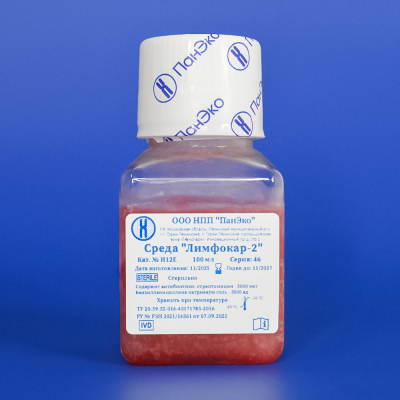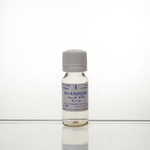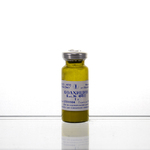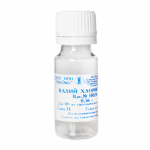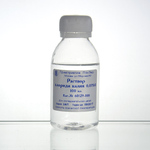Lymphokar-2 Medium
Ready-to-use medium, includes all the necessary substances for cultivation of whole blood lymphocytes. It is intended for cultivation of blood lymphocytes in vitro in order to obtain an enriched population of dividing cells and subsequent analysis of metaphase chromosomes.
Lymphokar-2 medium is auxiliary tool in the diagnosis of possible pathological disorders at the genetic level. It is used for in vitro diagnostics (karyotyping) - for cultivation of blood lymphocytes in vitro and subsequent cytogenetic analysis of metaphase chromosomes with mitotic index calculation.
The analysis is carried out using culture of human peripheral blood lymphocytes and preparation of metaphase chromosomes. Heparinized blood is used for analysis.
Ready-to-use serum-free medium, includes all necessary substances for cultivation of whole blood lymphocytes: a mixture of inorganic salts, amino acids, vitamins, glucose, phenolic red, antibiotics, as well as PHA-P, etc. The Phytohemagglutinin-P (PHA-P) in the medium at the optimal concentration for human lymphocytes provides mitogenic effect of the medium.
Stopping mitotic division with subsequent accumulation of metaphase plates is achieved by incubation of cells with colchicine. For analysis, the cells are transferred to hypotonic solution of potassium chloride, fixed, applied to a slide and stained, according to generally accepted methods.
This product is intended for research purposes. The product has a Russian registration certificate as a medical product.
PREPARATION INSTRUCTIONS:
Before use, the medium should be thawed. Defrosting should occur naturally in the refrigerator at temperature of +2 to +8 °C. Don't accelerate defrosting at temperature of 37 °C. Avoid multiple freeze-thaw cycles.
After defrosting and stirring, the medium should be clear, red-orange solution, without opalescence and sediment.
CULTIVATION METHOD:
1. Before use, carefully mix the contents of the bottle with medium. Manipulate the product in aseptic conditions.
2. For cultivation of 0.5 ml of blood, it is recommended to use 7 ml of medium. In a sterile container (vial, test tube, etc.), add 7 ml of medium.
- Lymphokar-2 cat. no.H11 and no.H212 with volume of 60 and 100 ml must be transferred to sterile containers with volume of at least 10 ml.
- Lymphokar-2 cat. no.H10 is available in ready-to-use volume of 7 ml test-bottle. The cultivation is carried out directly in the test-bottle.
3. Add 0.5 ml of whole heparinized blood to the container with the medium.
4. Cell cultivation is carried out in a thermostat at 37°C for 72 hours.
5. Mitotic cell division is stopped by treating cell culture with 50 µl Colchicine solution (0.1 mg/ml in 5 distilled water).
6. 1.5-2 hours after colchicine is added, shake the container and transfer the suspension to a centrifuge tube. For analysis, the obtained cell suspensions are centrifugated at 1000-1500 rpm for 5-7 min.
7. Then the cells are treated with hypotonic solution of potassium chloride (0.075M: dissolving 0.56 g of KCl in 100 ml of distilled water). Preheat the solution to 37 °C.
8. After centrifugation, remove supernatant, break up precipitate and add 10 ml of heated hypotonic KCl solution to the test tube. Mix the precipitate well and place the test tube in a thermostat at 37°C for 10-12 min.
9. The treated cells should be centrifugated at 1000-1500 rpm for 5-7 min.
10. The supernatant should be removed, leave 0.5-1.0 ml of fluid, and resuspend the cells by shaking.
11. Fix cells with a freshly prepared mixture of methanol and acetic acid in a ratio of 3:1. Add fixing solution (2-3 ml) in a tast tube, and bring the volume to 6-8 ml. Break up the sediment and put the test tube in the refrigerator for 5-10 min.
12. Centrifuge at 1000-1500 rpm for 5-7 min. Remove the supernatant, add 8-10 ml of cooled fixative solution to the sediment. Break up the sediment. Then stand at 4° C for 15-20 minutes, placing in the refrigerator.
13. Treat cells twice with fixative solution.
14. Centrifuge at 1000-1500 rpm for 5-7 min. Remove the supernatant, break up the sediment and put the test tube in the refrigerator before staining the tested samples.
15. Resuspend the precipitate in 0.5-1.0 ml of fixative solution and put the suspension on cooled, water-soaked slides. Fix the glass, quickly hold it over the flame of the burner or dry it at room temperature.
16. The slides are stained according to the standard protocols by Giemsa Stain.
This Instruction is developed on the basis of recommendations for development of chromosomal preparations (Methodical manual for doctors "Cytogenetic methods of chromosomal diseases diagnoses", Moscow, 2009).
HOW SUPPLIED: in sterile plastic bottles of 7, 60 or 100 ml. Euroflasks have a wide neck, convenient for work.
SHELF LIFE: 2 years. Shelf life after opening: 60 days.
STORAGE: -10 to -20 °C in a place protected from light. After opening store at temperature +2 to +8 °C.
RECOMMENDED USE:
- Do not use the product after its expiry date.
- Use gloves, mask and clothes adapted to the manipulation of the product to avoid contamination.
- Manipulate the product in aseptic conditions.
- Supplements such as antibiotics or L-Glutamine should be added as sterile supplements to the ready medium.
- Medium should be clear and free of opalescence and sediment.



